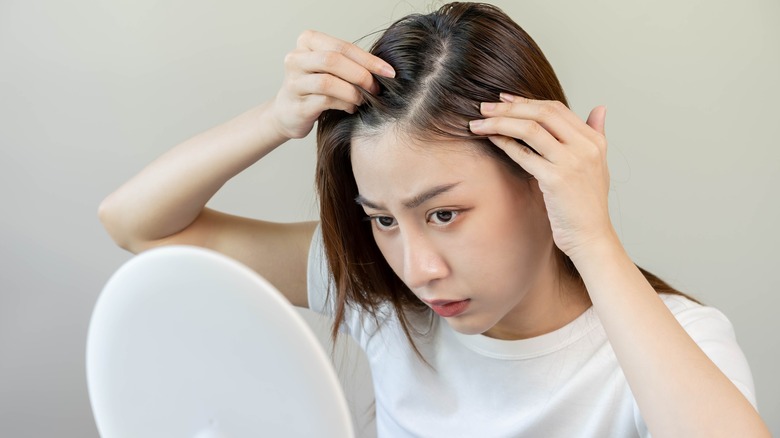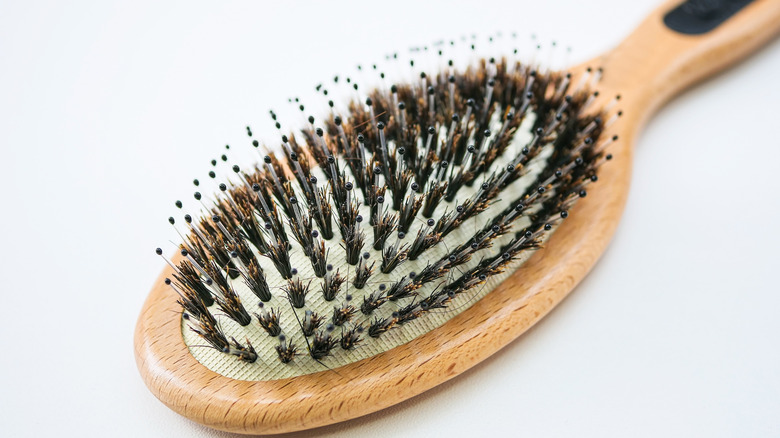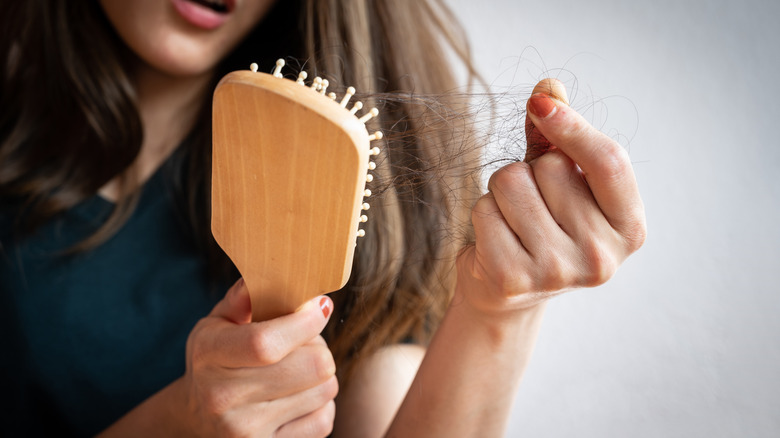Which Hairbrush Is Best For Thinning Hair?
Thinning hair can be caused by a variety of different reasons including medical issues, lifestyle habits, and just plain old genetics (via Healthline). It's important to note that thinning hair does not equate to balding. With thinning hair, you lose more strands but don't necessarily have bald spots or patches.
Thinning simply means that you are losing strands at a faster rate than normal. Believe it not, losing 50-100 strands a day is considered normal according to the American Academy of Dermatology Association.
Thinning hair can also be temporary and hair shedding often occurs after birthing a baby, having an illness or nutritional deficiency, undergoing high amounts of stress, losing over twenty pounds, or even when you stop taking birth control pills.
Hair loss can also result from harsh chemical treatments and consistently putting your hair up in ponytails or other styles that tug at the follicles. If you have thinning hair, you'll want to be very careful about the type of brush you use.
Make sure to choose a gentle brush
The first thing to do when dealing with thinning hair is to be as gentle with it as possible. That means whenever you put anything in your hair, from shampoos and conditioners and styling tools and brushes, always choose the option that is most gentle on your delicate strands.
Hair stylist Nubia Rëzo tells Bustle, "For thinning hair, it is advised to use only gentle brushes. A soft bristle brush is convenient enough to detangle, but gentle enough to where it will not rip your hair out."
For medium to fine hair, use a brush with natural boar bristles, which are most similar to natural hair and won't tug at weak strands. They may also stimulate hair growth due to their gentle yet consistent movement on the scalp (via Hair & Scalp Specialists). Boar bristle brushes support oil glands by helping your hair's natural oils get evenly distributed. This helps prevent dryness which can lead to hair breakage.
For thicker hair, look for a brush that combines both boar bristles and soft nylon bristles. The nylon will help gently comb through tangles and soften strands at the same time. To generate more volume, choose a small brush that can get close to the root to gently lift them.
Don't brush your hair too often
Even with the gentlest of brushes, brushing your hair too often can result in losing more hair. You want to brush only when absolutely necessary (via Woman's World). When you brush excessively, the constant pulling and tugging can lead to hair breakage.
"Over-brushing can mean both brushing too much, and using too much pressure directly on your scalp. This can cause damage to both your hair strands and to the hair follicle, says board-certified dermatologist Dr. Julie Karen (via Elite Daily). "A damaged or unhealthy hair follicle will impede healthy hair growth, and hair breakage will make already thinning hair appear more thin."
The worst thing you can do with thinning hair is to brush your hair when it's wet. Wet hair is much less strong than dry hair so will break more easily.
By learning how to best care for your thinning hair, you may be able to restore it and boost growth and volume.


